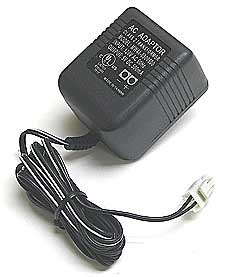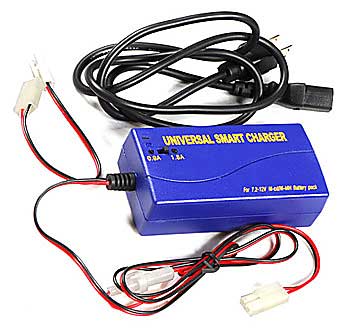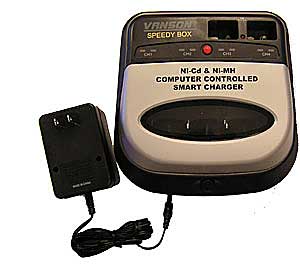by Tom Gaylord
Copyright PyramydAir.com ©2008. All Rights Reserved.
Now that you know the types, mAH ratings, voltages and technology of airsoft rechargable batteries, it's time to discuss recharging. If a gun comes with a battery and a charger, the owner's manual gives instructions on how to recharge the battery. Pay close attention to those instructions, because the different types of batteries have very different charging requirements.

A standard charger usually comes with the gun. It charges at one rate only, and that's usually a low rate for safety.
Pay attention!
Battery chargers are built with several possible features that govern how they're to be used. Twenty years ago, most rechargeable batteries were NiCad and operated the same way. Owners didn't have to pay as much attention to how they charged them, but the times have changed. Now that the world has NiMH, Li-ion and even other exotic rechargeable battery technologies, it matters a lot how they're recharged. Failing to follow the directions can destroy the batteries and can even result in fires and explosions.
You can refer back to Part 1 of this report for specifics about which technologies charge slow or fast, but most people don't care. All they want to do is charge one battery. That can change suddenly, however, when they get a new gun or even buy a spare battery for the one gun they own. Each battery has an mAH rating and voltage printed on the outside, although some battery packs are encased in transparent plastic sheaths and are connected in a series. The information printed on the outside of one cell in a long string of cells pertains to the voltage of that cell, only. To get the total battery voltage, you have to add the voltage of all the cells in the series. If you have seven cells, each with a 1.2-volt rating, you have a combined 8.4 volts (7 x 1.2 = 8.4). These cells might have a 1,200-mAh rating or they might have a 2,300-mAh rating. Whatever rating one cell has will be the rating of the total battery it's part of.
The higher the mAh rating, the longer the battery takes to charge--all things being equal. With certain technologies, such as Lithium-Ion, the charging rate is so fast that the difference is a trifling bit of time. You'll probably never notice. With Nickel-metal hydride technology, however, the amperage capacity is extremely important, because that technology cannot accept a charge above a certain rate.
Know what you're doing!
It's dangerous to mix battery chargers with batteries unless you know they are compatible. You often don't have to do anything more than hook up your battery to the charger that came with it. The company selling the battery knows the top charging rate that battery is rated to accept, and they include a charger that doesn't exceed that rate. Sometimes, though, there can be other factors. To save money, the gun company may have only given you a minimal charger. Sometimes, it's possible to buy a faster battery charger. Other times, the battery you're trying to charge cannot accept a charge any faster than the charger that came with it. Most good instruction manuals will include this information, but not always. You may have to do your own research online to discover what charging rate a certain battery can take.
Danger!
Do you have a drawer or a box filled with spare battery chargers? Most people do, and that can get you into trouble just as fast as a well-meaning but unknowledgeable friend who says your charger is just a cheap one and will take forever to charge the battery. Sometimes, a low-rate charger is exactly what you need!
Improper charging destroys batteries
Battery retailers say that more batteries are damaged by improper charging than by any other cause. The faster the charge rate, the greater the risk to the battery; therefore, you need to be very certain about the charging solution. As clumsy as it may be to own many specialized chargers, it's also the safest way to proceed.
Universal chargers
If you know what you're doing, it's possible to buy chargers that can be set to charge at variable rates. These types are useful when you own a lot of different airsoft guns and perhaps some radio-controlled models that use different batteries. Simple universal chargers come with a variety of connection cables and switches for you to set the various voltages and charging rates. They also have a host of adaptors to fit various types of battery connections. More exotic chargers come with computer-controlled sensing devices that detect the battery's technology (called cell chemistry in the trade) and charge accordingly.

A universal charger can charge different battery packs at different charging rates. It's manually controlled.

A smart charger is computer-controlled and charges the battery, although some fancier ones can balance cells and do other things that add life to batteries.
Temperature during charging
Usually, this shouldn't be a major concern, because you'll charge your batteries inside a building where the temperature will be between 10-40 degrees C (50-104 degrees F). If you charge in the garage in the winter in a cold climate, both NiCad and NiMH batteries will generate excess gas inside their cells --shortening their lives.
Charging rates
There are different battery charging rates--slow, and fast. The slow rate charges at one-tenth the battery's specified amperage and can take up to 12 hours to fully charge. Some trickle chargers charge at one-third the specified amperage and take up to 4 hours. A fast charge takes one hour and charges at 120 percent of the battery's specified amperage. It takes a specialized battery to tolerate charging at this rate, and the battery comes with instructions to that effect. If you aren't sure your battery can take it, don't try to force a charge at a fast rate.
The charging rate is not elective and has nothing to do with how fast you want the battery to be ready. Overcharging a battery not built for a fast rate can destroy it.
There are some very special NiCd batteries that can tolerate a 5x charging rate. These are the batteries that charge in 15 minutes. At present, no NiMH batteries are recommended for charging rates higher than 120 percent of their specified amperage.
Lithium chemistry batteries also have some special charging requirements. One is to guard against excess heat. This is such a concern that larger batteries come with fans built into their chargers. For prolonged life, Li-ion batteries should be stored at a cool temperature (below 80 degrees F), if possible.
Summary
Batteries have gone from simple to complex by the introduction of modern technology. Performance, however, has been enhanced many times and is worth the extra effort we must take to keep our batteries running. As never before, it's important that you understand the batteries you have and follow the instructions for their charging and maintenance. If you do, you'll be rewarded with a long service life and power when you need it.
Buy With Confidence
Get FREE shipping on qualifying orders! Any order $150+ with a shipping address in the contiguous US will receive the option for free ground shipping on items sold & shipped by Pyramyd AIR during checkout. Certain restrictions apply.
Free shipping may not be combined with a coupon unless stated otherwise.
View Shipping Info
We work hard to get all orders placed by 12 pm EST out the door within 24 hours on weekdays
because we know how excited you are to receive your order.
Weekends and holiday shipping times will vary.
During busy holidays, we step our efforts to ship all orders as fast as possible,
but you may experience an additional 1-2 day delay before your order ships.
This may also happen if you change your order during processing.
View Shipping Times
It's important to know that due to state and local laws, there are certain restrictions for various products.
It's up to you to research and comply with the laws in your state, county, and city.
If you live in a state or city where air guns are treated as firearms you may be able to take advantage of our FFL special program.
U.S. federal law requires that all airsoft guns are sold with a 1/4-inch blaze orange muzzle
or an orange flash hider to avoid the guns being mistaken for firearms.
View Shipping Restrictions
Get the most out of your equipment when you work with the expert technicians at Pyramyd AIR. With over 25 years of combined experience, we offer a range of comprehensive in-house services tailored to kickstart your next adventure.
If you're picking up a new air gun, our team can test and tune the equipment before it leaves the warehouse. We can even set up an optic or other equipment so you can get out shooting without the hassle. For bowhunters, our certified master bow technicians provide services such as assembly, optics zeroing, and full equipment setup, which can maximize the potential of your purchase.
By leveraging our expertise and precision, we ensure that your equipment is finely tuned to meet your specific needs and get you ready for your outdoor pursuits. So look out for our services when shopping for something new, and let our experts help you get the most from your outdoor adventures.
View Service Info
Shop and purchase with confidence knowing that all of our air guns (except airsoft) are protected
by a minimum 1-year manufacturer's warranty from the date of purchase unless otherwise noted on the product page.
A warranty is provided by each manufacturer to ensure that your product is free of defect in both materials and workmanship.
View Warranty Details
Didn't get what you wanted or have a problem? We understand that sometimes things aren't right and our team is serious about resolving these issues quickly. We can often help you fix small to medium issues over the phone or email.
If you need to return an item please read our return policy.
Learn About Returns
Get FREE shipping on qualifying orders! Any order $150+ with a shipping address in the contiguous US will receive the option for free ground shipping on items sold & shipped by Pyramyd AIR during checkout. Certain restrictions apply.
Free shipping may not be combined with a coupon unless stated otherwise.
View Shipping Info
Want More?
Join Our Email List for News and Deals!
Join the Pyramyd AIR mailing list: Our e-mails are filled with new products, deals, sneak peeks, tips and tricks, contests and more - sign up today!
Text JOIN to 91256 and get $10 OFF Your Next $50+ Order!
* By providing your number above, you agree to receive recurring autodialed marketing text msgs (e.g. cart reminders) to the mobile number used at opt-in from Pyramyd AIR on 91256. Reply with birthday MM/DD/YYYY to verify legal age of 18+ in order to receive texts. Consent is not a condition of purchase. Msg frequency may vary. Msg & data rates may apply. Reply HELP for help and STOP to cancel. See Terms and Conditions & Privacy Policy.